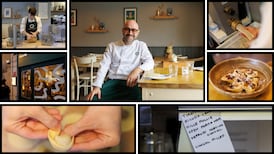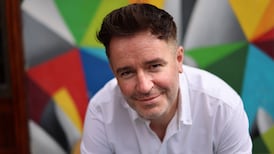In-demand television director, double Bafta winner, writer of high-stakes drama, designer of the RTÉ logo: Neasa Hardiman has an impressive CV. What the Dubliner is not, however, is skilled with horses.
“I’m such a terrible horse rider. It was a tragedy for all of us. But luckily I’m a keen walker!” she says of working in remote stretches of British Columbia, the stunning stand-in for Yosemite in the Netflix mystery series Untamed.
Being surrounded by vast, “unadulterated wilderness”, with its grizzly bears, elks and “huge, searing mountains”, was “extraordinary”, she enthuses, with the two episodes she directed demanding the presence of a bear specialist – and a cameo from a rattlesnake.
For a climactic scene between Eric Bana, playing the grieving lead in the series, and Omagh-born actor Sam Neill, they found a “gorgeous” waterfall, but it required lugging the film equipment up a narrow, 20-minute path by hand.
READ MORE
“Some of the gear we had to put on horseback. There was just no other way to get there. We had these two camera operators balancing themselves on ledges and ridges, and strapping the camera with bungees to get the shots. It was wild.”
You didn’t have to do this on Holby City, I assume?
“Not so much,” she says.
As we meet in August, in a cafe not far from her Ranelagh home, Untamed has become a hit for the streamer, but Hardiman is back at Dublin altitudes and she’s swapped the suspense and raw emotion of that series for the comic tone of a “really cool” project closer to home.
“It keeps me out of trouble,” she says of the short gap between Untamed and Tall Tales & Murder, an upcoming series written by Stuart Carolan of Love/Hate fame. It’s directed by Hardiman and Chris Addison, a friend of hers and an “absolutely lovely guy” known as Ollie to fans of BBC satire The Thick of It.

As soon as Irish company Metropolitan Pictures sent her Carolan’s script for the BBC Northern Ireland and RTÉ-commissioned series, she knew she wanted to do it.
“It’s kind of Coen brothers’ territory. It’s quite surreal and really good fun and he’s just a lovely writer. The dialogue is just cracking,” she says, contrasting Carolan’s ear for “Dublinese” with “nails on the blackboard” attempts by outsiders to the city.
[ Film Sea Fever: Claustrophobic Irish-ish horror couldn’t be more prescientOpens in new window ]
She has been editing her episodes and, as we chat over breakfast, has “a little bit more shooting to do” on the crime caper, which is expected to air in early 2026.
“There’s nothing else like it on Irish television. It’s incredibly inventive, the performances are fantastic, and the storytelling is insane.”
Although Hardiman has lived in Dublin throughout her career, most of it has involved “kind of commuting to work”. The BBC “cradled me as a baby director”, she says, and she claimed her first Bafta for children’s series Tracy Beaker Returns, then a second for Sally Wainwright’s acclaimed Happy Valley.
This was followed by a decade of working with deep-pocketed US streamers on shows such as Marvel series Jessica Jones, Amazon’s The Power (adapted from Naomi Alderman’s science-fiction novel) and Hulu’s historical drama We Were the Lucky Ones.
“In the intervening years, oh my god, the landscape of the industry in Ireland has changed absolutely radically and it is world class. That’s been incredibly exhilarating for me as someone who has had to go to other countries to get a break as a drama director.”
There “just wasn’t a huge amount of opportunity” in Ireland when she started out, though she is grateful to RTÉ for giving her “a foothold on the bottom rung” after she graduated from the National College of Art and Design.
The last thing she did as a graphic designer for RTÉ, in 1995, was to create the logo it still uses – only the colours have changed. She introduced a contemporary typeface with “resonance of the old Celtic script”, removed the Brigid’s cross and added the fada to the “E”.
“It is a thrill, I must confess, every time I pass by Donnybrook and I see that logo,” she says. She mentions that it is on the cusp of a refresh. “I’m heartbroken! No, I’ve had a good run.”
After securing a much-coveted place on RTÉ’s producer-director training course, she directed documentaries and entertainment shows, among them the Eurovision Song Contest held in Dublin in 1997. But it was her stint on soap opera Fair City that proved most formative. She discovered that she loved working with actors and that drama could be “just as truthful” as documentary.
“Great actors will be fully focused on each other and there’s nothing more thrilling than that exchange of emotion between people when it’s live and quivering and you don’t know what’s going to happen next. I was just addicted after that.”
It’s so lovely to be at home working with people who speak your language in every possible sense of the term
— Neasa Hardiman
While directing current affairs programmes, she grew unsettled by what she calls a “power imbalance” in their production.
“I was feeling uncomfortable about how to manage the responsibility of someone sharing their life’s experience with me,” she says.
“When I started working with actors I thought this was a way of telling stories where we can really lean into the emotion, and the bargain between me behind the camera and the person in front of the camera is much more even.”
In the early 2000s, when she wrote and directed for theatre and made short films, she decided that there was a common thread to all creativity.
“We find a seam of gold and we keep on refining and refining and refining. That’s my understanding, and I just love it. I cannot tell you how much fun it is.”
But around this time there was “a sort of received wisdom” among broadcasting executives – not only in Ireland – that audiences weren’t interested in TV drama, and that game shows and reality TV were where the industry was headed.
“I found that really dispiriting, and I’m really delighted that it’s proven to be completely untrue.”
Last year, she was appointed to the board of RTÉ. “It’s a responsibility, isn’t it?” she says, after I ask her if she had any hesitancy about it, given previous board meetings attracted intense public scrutiny in the wake of RTÉ’s corporate governance scandals.
“You put your own livelihood and your own credibility and your reputation on the line. As freelancers we live and die by our reputation, so, yeah, I didn’t take it on lightly, but I have a really strong connection to RTÉ.”
By this she means her own employment, but there’s also a family link. Her father, Tom Hardiman, was director general of RTÉ from 1968 to 1975. She was six when he left, and it was only after she was hired in the 1990s – “by people who didn’t know him,” she stresses – that she was struck by how young he must have been when he was appointed
“He was in his 30s! I said to him, ‘God, that’s extraordinary.’ And he said, ‘No, no, you don’t understand. Everybody was in their 20s and 30s’.”
Because television was the tech industry of the day?
“Yeah! He was one of the older people in the organisation at the time.”
Hardiman is married to sculptor Adam May and they have two children – daughter Taillte and son Naoise – who are in their 20s. She is the youngest of five, and her siblings Niamh, Enda, Orla and Ronan have been successful across a diverse span of professions, including neurology (Orla) and music (Ronan).
“They’re all very driven,” she says, attributing this to her late parents. Her father, born in 1929, and her mother Rosaleen, born in 1932, both lost a parent at an early age and grew up in “the new Ireland” amid poverty and disadvantage.
“I think they both had this really strong drive that a lot of people of their generation had. It was a new world, a new country, and a case of: ‘We’re nation builders and we’re going to do this’. My dad got a scholarship to university and managed to make it as an engineer and they shifted class, really, but I think for us as their children that kind of drive doesn’t just disappear into the ether. It’s there when you’re eating your dinner, it’s part of your life.”
We discuss Hardiman’s doctorate in film theory, for which she studied films made by Kathryn Bigelow, Ang Lee and Jane Campion. She did it because she had been “saying yes to every commission I could”, yet most of the conversations she had were about how to tell a particular story, rather than why.
Last year she completed a professional diploma in advanced generative AI because she didn’t want to “fall into that trap” of just being afraid of it. Talk about AI reminds her of the great “Photoshop is going to destroy the world” alarm of the 1990s. Being “quite techie”, she wanted to engage with AI, and her feeling is that it’s a useful tool for filmmakers, incapable of replacing them.

Between directing jobs, she writes. She has projects with three Hollywood production companies in the works and finds writing “really pleasurable”.
Sea Fever, the horror film she wrote and directed (now on Disney+), was a labour of love that wound up missing its Irish cinema-release date in Covid-stricken April 2020, though its infection and quarantine theme saw it acquire an eerie and compelling timeliness for its digital release.
“I know, right! It was weird.”
High-stakes drama is “kind of what I do”, she says, and she’s glad that one question commissioners used to always ask – “in what way is this an Irish story?” – has become less common.
“I think if you’re telling a story in Ireland, it’s an Irish story.”
Now, after “years and years and years” of racking up credits overseas, Tall Tales & Murder has convinced her that she would like to work in Ireland more often.
“That’s the thing for me. It’s so lovely to be at home working with people who speak your language in every possible sense of the term.”
Untamed is on Netflix now.

















